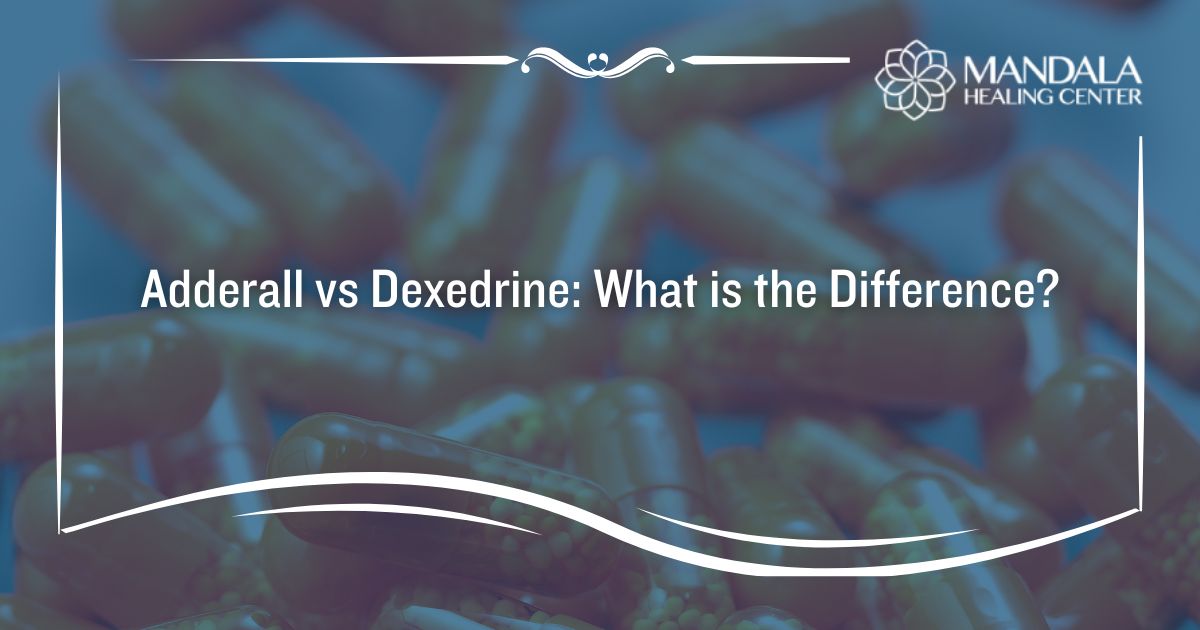Prescription stimulants are used to manage attention deficit hyperactivity disorder (ADHD). They increase the amount of dopamine and norepinephrine in the brain, increasing focus and lessening impulsivity among people with the condition.[1] If someone without ADHD consumes a prescription stimulant, they might experience a high associated with euphoria and increased energy.
Two of the most common prescription stimulants are Adderall and Dexedrine. Adderall contains two medications in one: dextroamphetamine and amphetamine salts.[2] On the other hand, Dexedrine only contains dextroamphetamine.[3]
Adderall and Dexedrine both contain dextroamphetamine. They are incredibly similar, so you may experience the same side effects, take the exact dosage, have the same potential for abuse, and use them to treat the same condition. That said, there are some differences to be aware of.
The main differences between Dexedrine and Adderall include their active ingredients, the age groups they’re designed for, the length of their effects, and the cost of the prescription.
In this article, you will learn:
- What is Adderall?
- What is Dexedrine?
- What are the differences between Dexedrine and Adderall?
What is Adderall?
Adderall is a stimulant medication that is used to treat ADHD. It contains amphetamine and dextroamphetamine, two stimulant drugs that can balance chemicals in the brain of people with attention-deficit hyperactivity disorder. Adderall treats ADHD symptoms by increasing the amount of dopamine and norepinephrine in the brain.
While Adderall is effective in managing ADHD, it is a common drug of abuse. For people without ADHD, consuming Adderall can lead to effects like euphoria, increased energy, sleeplessness, and extreme weight loss over time.
The side effects of Adderall might include:[2]
- Anxiety or nervousness
- Headache
- Changes in sex drive or ability
- Painful menstrual cramps
- Dry mouth
- Diarrhea or constipation
- Nausea
- Changes in appetite and weight loss
Because Adderall can cause a high among people without ADHD, it is considered a Schedule II drug.
What is Dexedrine?
Dexedrine (dextroamphetamine) is a central nervous system (CNS) stimulant used to treat ADHD. It works in the same way as Adderall, increasing dopamine and norepinephrine in the brain to reduce the symptoms of ADHD. That said, it is also a Schedule II drug because of its high potential for abuse.
The common side effects of Dexedrine include:[3]
- Headache
- Dry mouth
- Unpleasant taste in the mouth
- Constipation or diarrhea
- Changes in appetite and weight loss
- Changes in sex drive or ability
If you use Dexedrine recreationally, you might experience a high that causes increased energy, euphoria, nervousness, and a fast heart rate. This ADHD medication is a controlled substance with potential for misuse and addiction. Long-term misuse of Dexedrine does require professional addiction treatment to achieve recovery.
What is the Difference Between Adderall and Dexedrine?
Dexedrine and Adderall are very similar medications. They both treat ADHD, contain dextroamphetamine, come in similar dosages, and cause similar side effects.
The main differences between Adderall and Dexedrine include:
Active Ingredients
Dexedrine only contains dextroamphetamine, while Adderall contains both amphetamine salts and dextroamphetamine. Even though Adderall contains extra substances, the two medications work very similarly. Your doctor can help you decide which one is best for treating your ADHD symptoms.
Ages for Use
Adderall can be used to treat ADHD in children 3 or older and in adults of any age. On the other hand, Dexedrine is only indicated for children aged 3 to 16.
Length of Effects
Immediate-release tablets of Adderall and Dexedrine last 4 to 6 hours. However, how long the extended-release formulas work varies.
For example, Adderall XR works for about 12 hours, while extended-release Dexedrine only works for 8 to 10 hours.
Cost of Prescription
Lastly, the cost of these medications can differ, but may be covered by insurance. A 30-day supply of generic Adderall usually only costs about $30. However, a 30-day supply of generic Dexedrine can cost you up to $175.
If you are not using insurance to cover the cost of your ADHD medications, it might be better to choose Adderall because it is cheaper. If your doctor thinks Dexedrine will be more helpful for your symptoms, you might need to find a way to afford it. Some websites have coupons for common prescriptions.
Get Connected to a Stimulant Abuse Rehab Center
If you or a loved one abuses prescription stimulants, you might have an addiction. Stimulant addiction can be difficult to recover from, especially on your own. Thankfully, stimulant addiction treatment programs can provide you with the tools and support you need to achieve long-term recovery.
At the Mandala Healing Center, we offer an evidence-based and individualized approach to stimulant addiction treatment. When you attend our program, we will use every tool in our arsenal to ensure you are successful in sobriety.
Why Choose The Mandala Healing Center? Clients are taken on a journey of healing through complete immersion into evidence-based clinical modalities, multifaceted alternative therapies, and expert medical management, allowing them to detox and recover from drug and alcohol addictions fully. Through a program of care designed to encourage change, a foundation is created that allows clients to find their higher purpose and reclaim their lives.
Contact us today for more information on our stimulant addiction treatment center.
References:
- Biological Psychiatry: Effects of Stimulants on Brain Function in Attention-Deficit/Hyperactivity Disorder: A Systematic Review and Meta-Analysis
- Medline Plus: Dextroamphetamine and Amphetamine
- The Food and Drug Administration (FDA): Dexedrine Label
















